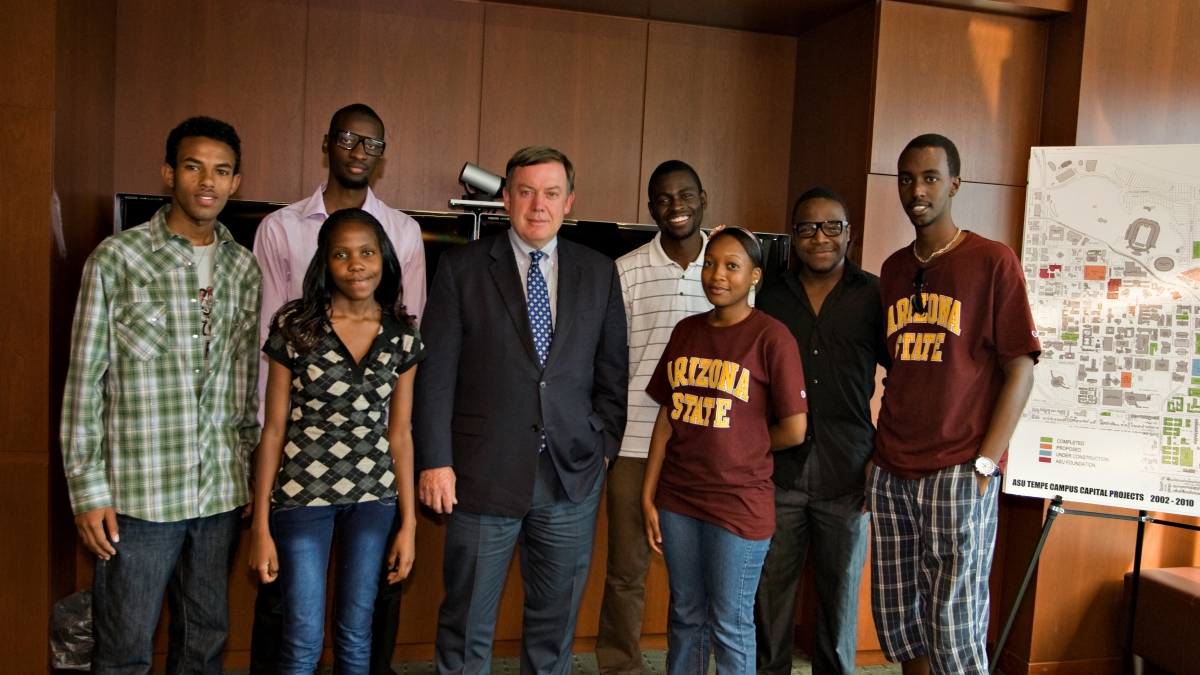African students earn degrees through $27M MasterCard Foundation, ASU partnership

Arizona State University welcomes 10 students from seven African nations this year, as the first class of MasterCard Foundation Scholars begin studies at ASU. As part of this program, ASU will receive $27.5 million over the next seven years to provide academically talented, yet financially disadvantaged, students from Africa, who are committed to giving back to their communities and countries, with access to high-quality education.
The MasterCard Foundation Scholars Program was announced today at a United Nations Special Session marking the launch of “Education First” – an initiative that seeks to ensure all children have access to quality education. The Scholars Program was highlighted as an innovative model for educating young people and encouraging citizenship.
Africa is one of the fastest growing regions in the world, yet the region lags behind in secondary and higher education completion rates. More than 2.2 million youth are expected to enter the labor force each year in Sub-Saharan Africa between 2011 and 2015, including academically talented young people who face significant barriers to quality education.
The MasterCard Foundation Scholars Program aims to educate and build a network of 15,000 scholars and enable them to contribute to the economic growth and social progress of their countries of origin. It offers a comprehensive package to students, which includes financial, academic and social support, as well as access to networks to make successful transitions to further education or the workforce in Africa.
ASU was selected by The MasterCard Foundation to participate in the program because of the university’s strong commitment to global engagement, supporting underserved populations, social embeddedness, sustainability and entrepreneurship. Scholars at ASU will build experiences, values and competencies that are critical to success in the global economy, and that enable them to give back to their communities and home countries.
The program will ultimately support 120 scholars at ASU.
“As African nations grow, their youth must prepare to become the future leaders of their countries – leaders who will usher in an era of innovation while addressing large-scale problems such as poverty, political instability and hunger," said ASU President Michael Crow. "Providing educational opportunities through the partnership between ASU and The MasterCard Foundation, the scholars program will give students the intellectual expertise to better serve their countries."
Scholars are supported throughout their educational journey with academic advising, financial guidance, peer support and career counseling. Students who are granted scholar status engage in community development activities while they are attending school and when they return home.
MasterCard Foundation Scholars at ASU speak of their desire to return home to address issues that affect their nations – electricity challenges, access to health care, safe drinking water, domestic violence, access to education, political freedom and illiteracy.
Rumbidzai Mugaro, of Zimbabwe, is a scholar at ASU majoring in mathematics in the College of Liberal Arts and Sciences. During a speech at the university, she spoke of the need to drive change in Africa and her desire to give back to her home country.
“Each of us here is driven by the change we believe in, a change we could have envisioned since we were children, a change we know will alleviate the status of our home countries, a change our experience at ASU will help come true,” she said. “The opportunity you have given us goes beyond the province of our imagination. ... We will all work toward achieving the change we want to see.”
Giresse Tchegho, of Cameroon, is working toward a degree in chemical engineering at the ASU Ira A. Fulton Schools of Engineering, as he pursues his ultimate goal of becoming a doctor and returning to work in his country where one doctor may serve hundreds of people.
When Tchegho heard the news that he was accepted as a MasterCard Foundation Scholar, he was ecstatic. “I was jumping all over the place. I was really happy,” he said.
Now he’s part of the ASU community, an “amazing” place where people are “really helpful.” Tchegho spends his days on campus from 8 a.m. to midnight, every day, working toward his educational goals, and he says he's planning on volunteering at area hospitals.
Additional members of the first class of MasterCard Foundation Scholars at ASU:
• Annan Detti, engineering, College of Technology and Innovation, Ethiopia
• Zemichael Hailu, aerospace engineering, Ira A. Fulton Schools of Engineering, Ethiopia
• Allen Kawanzaruwa, mathematics, College of Liberal Arts and Sciences, Zimbabwe
• Rumbidzai Mugaro, mathematics, College of Liberal Arts and Sciences, Zimbabwe
• Gamuchirai Tavaziva, biochemistry, College of Liberal Arts and Sciences, Zimbabwe
• Ibrahima Diop, electrical engineering, Ira A. Fulton Schools of Engineering, Senegal
• Verah Nyarige, biochemistry, College of Liberal Arts and Sciences, Kenya
• Christy Nyarwaya, electrical engineering, Ira A. Fulton Schools of Engineering, Rwanda
• Ama Owusu-Darko, health sciences, School of Nutrition and Health Promotion, Ghana
ASU joins a global network of institutions that were selected for their shared values, academic excellence, nurturing environment and programs relevant to growth sectors in Africa. Other partners currently involved in The MasterCard Foundation Scholars Program are: American University of Beirut – Faculty of Health Sciences; Ashesi University; Duke University; EARTH University; Michigan State University; Stanford University; University of California-Berkeley and Wellesley College. The program also includes a partnership with African Leadership Academy to develop an African-based careers network for Scholars to access internships and jobs across the continent.
To learn more about the program, visit mastercardfdnscholars.org.